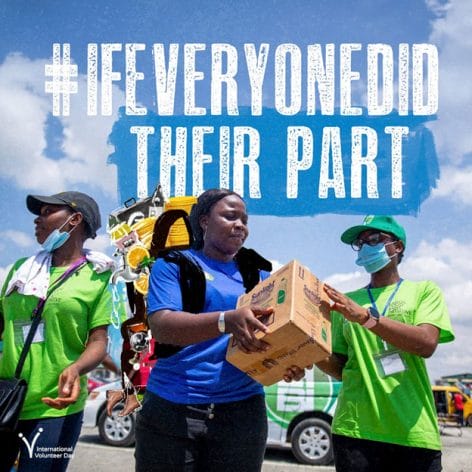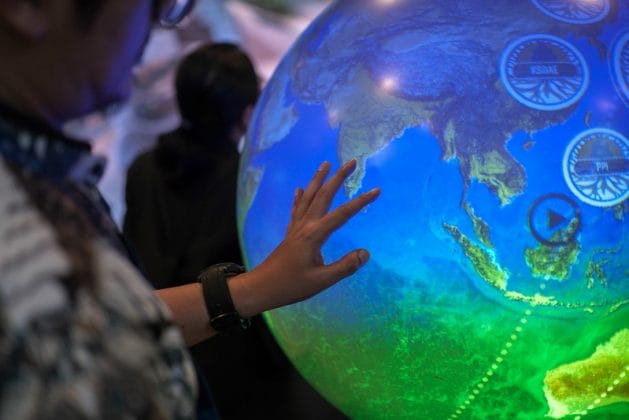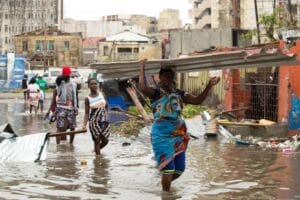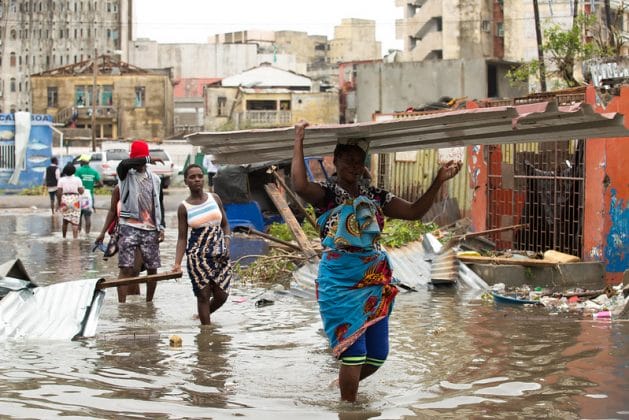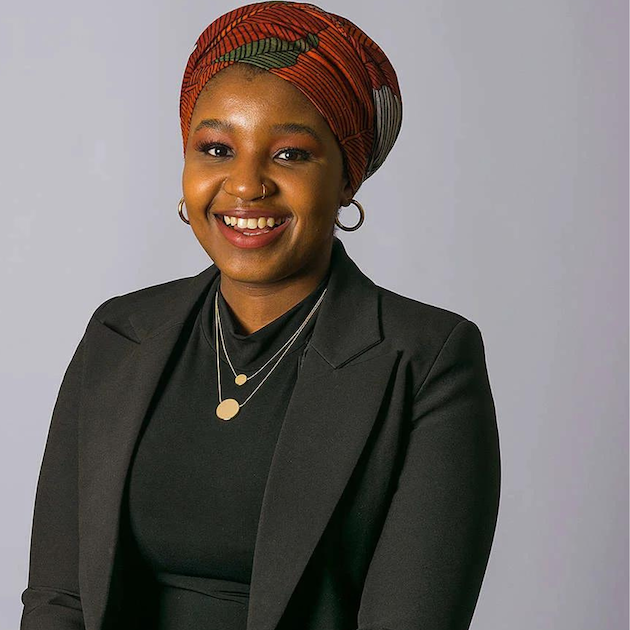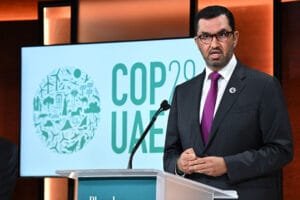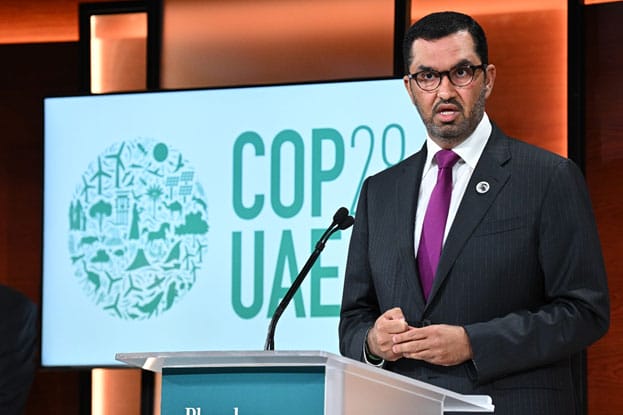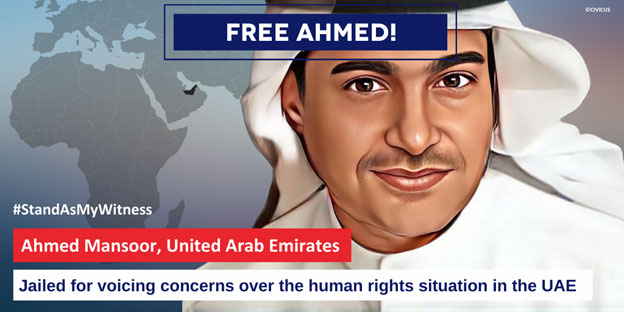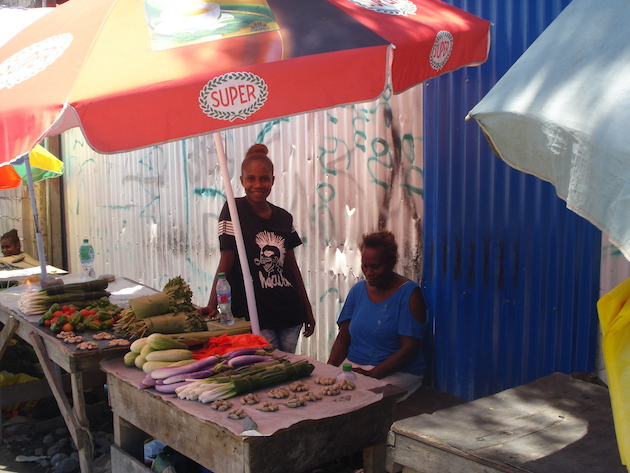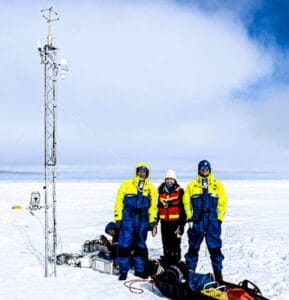
Civil Society, Climate Action, Climate Change, Conferences, COP28, Energy, Environment, Global, Headlines, Indigenous Rights, TerraViva United Nations
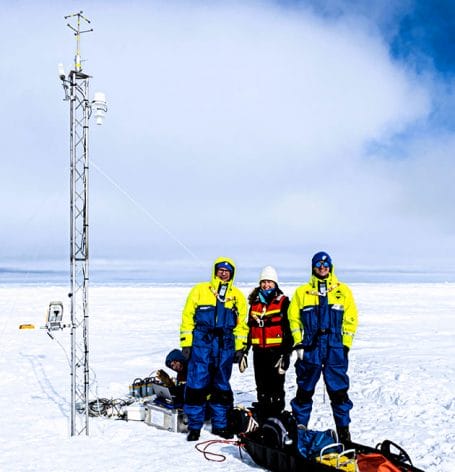
Research team in the Arctic. Professor Tjernström is standing on the left.
– This year’s UN Climate Change Conference is taking place in Dubai from 30 November to 12 December. The so-called COP summits are organised every year and constitute a means for the global community to agree on ways to address the climate crisis, such as limiting global temperature rise to 1.5 degrees Celsius, supporting vulnerable communities to adapt to the effects of climate change, and achieving net-zero emissions by 2050.
More than 70,000 delegates are attending the COP28 in Dubai. Main delegates are the 47 representatives of the member states (called Parties), which constitute the UN Framework Convention on Climate Change (UNFCCC). Business leaders, young people, climate scientists, Indigenous Peoples, journalists, and various other experts and stakeholders are also among the participants. Officially, COP 28 stands for the 28th meeting of the Conference of the Parties to the UNFCCC.
UNFCCC was established in 1992 to combat “dangerous human interference with the climate system”, in part by limiting the greenhouse gas emissions that compromise Earth’s entire ecosystem, a prerequisite for human existence. Among other items on its agenda COP 28 will address progress made in accordance with the Paris Agreement of 2015, when 195 Parties of the UNFCCC agreed to keep the rise of global temperature to well below 2 °C (3.6 °F), compared to pre-industrial levels, and preferably limit the increase to 1.5 °C (2.7 °F).
To gain a scientific perspective of the meaning and influence of COP28, IPS asked Professor Tjernström about his views on climate change and what he assumes might be done to amend it. Michael Tjernström is since 2001 professor of Meteorology at Stockholm University. He has spent several periods at institutions such as CIRES, The Cooperative Institute for Research in Environmental Sciences (CIRES) and The Earth System Research Laboratory (ESRL) and National Center for Atmospheric Research (NCAR), all in Boulder, Colorado, USA. Professor Tjernström’s main research interests concern climate change in the Arctic. He has participated in several scientific expeditions to Arctic areas and is since 2011 a member of the International Arctic Science Committee.
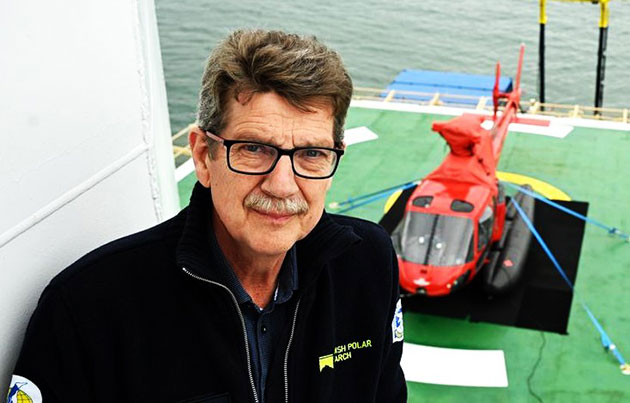
Michael Tjernström
IPS: Professor Tjernström, can the outcomes of COP28 drastically affect current climate changes?
Michael Tjernström: The COPs are a necessary and essential factor when it comes to addressing climate change. A COP summit might be likened to a regular check-up visit to the dentist. It can be painful, but is necessary for good dental hygiene. The dentist might find that your teeth are in a very bad state and to save them, urgent measures have to be taken – caries has to be amended, maybe a bad tooth has to be extracted, dental bridges inserted, etc . The point is that the dentist is an expert and you have to trust him. However, the decision to save your teeth is all yours. In a similar fashion the COPs intend to amend already present damages to the climate, determine their causes and try to prevent a negative development. But it is up to the members to act.
IPS: How do you perceive the UN’s role in this endeavour?
Michael Tjernström: There is absolutely no other global organization other than the UN which would be able to organize and be in charge of such a process. No other national, international, political or private, organisation would be able to establish a global consensus and general awareness, as well as maintaining the perseverance, stamina, objectivity and legal strength to do so. An endurance against all odds, but nevertheless made possible through the UN’s established rules, combined with its global and local outreach. Of course, there are cracks and concerns, but the administrative structure and operations of the UN are firmly based on the commitment of its member states.
People, who in general are prone to criticize the UN system are often only perceiving the actions of the Security Council and how its commitment is crippled by the veto power of its five permanent members. However, this does not apply to the UNFCCC and its scientific support organisation, ICCP. As a scientist and propagator for awareness about climate change, I perceive the lack of understanding the great importance of the UN as a marketing problem. People are not aware of what this global organisation stands for, and even less so – its support of the global scientific community.
IPS: Will you attend the COP summit in Dubai?
Michael Tjernström: No, most scientists have through their research already made their fair contribution to efforts to combat climate change. The current state of research, results and warnings are comprehensively explained and diffused through the ICCP reports and scientists have thus no need to attend the COPs. Whether or not politicians listen to science or not is not determined by my presence at a COP.
COP summits are more politically than scientifically motivated. However, they are based on the factual basis provided by ICCP reports. The COPs mainly attract other stakeholders than scientists, such as government representatives, spokespersons for environmentalist pressure groups and lobbyists representing the interests of fossil fuel-based industries, as well as oil and coal producing companies. Many such lobbyists try to find a place among decision makers, while environmentalists might be looking for political scapegoats.
People and organisations are trying to highlight their own, often specific interests, some of them being based on doubtful assumptions and moral priorities. Environmentalists have often demanded that certain interest groups be excluded from COP summits, like those lobbying for the use of fossil fuels, interests of oil producers, as well as industrialists who, for the sake of their own profit, try to minimize the threat from global warming.
Nevertheless, it is important that influential stakeholders are present . The global outreach demands this. Everyone has to be allowed to have their voice and concerns heard, as well as being provided with an opportunity to be informed about scientific achievements, new environmentally friendly technologies, and the threats of global warming.
Industrialization based on non-polluting and zero emissions of greenhouse gases, as well as new eco-friendly technology, are essential for change and improvement. Environmentalism’s contributions are also important. Like most revolutionary movements radical environmentalists highlight political and capitalist motivational reasons and misconduct, while they demand change and sacrifice. Historically did socialists and suffragettes contribute to emancipation and justice. However, some revolutionaries have turned into fanatics, and some have concentrated on relatively minor but easily targeted issues while ignoring an overall picture. For example, opponents to air travel are maybe not fully aware of the fact that it actually contributes to only three percent of global greenhouse emissions, while private cars and other fossil-fuel based transportation means account for much more of carbon dioxide emissions . It might be stated that it would be more beneficial for the environment to limit the use of your car, than avoid travelling by air. Veganism may be considered as beneficial when it comes to emission of greenhouse gases, though methane emissions from ruminating animals constitutes less than five percent of greenhouse gas emissions. If we could stop throwing away a third of all the food we produce, this would be much more efficient and would also have other benefits. However, every effort to limit greenhouse emissions is worthy of attention, though decisive and comprehensive political actions are particularly crucial for achieving zero greenhouse gas emissions as quickly as possible. It is not enough to limit them; they must be eliminated.
IPS: But can COPs really have the impact you could wish for?
Michael Tjernström: In several respects, development is moving in the wrong direction, especially when it comes to acquiring knowledge. Many confide in badly informed, or even deceitful, social media and populist politicians. In certain circles a negative attitude to research and science is thriving. Science might by such groups be perceived as an essentially separate activity, practiced by an intellectual elite devoting itself to mutual admiration.
The COPs make participants aware of the fatal threat of global warming. But more than that, it also makes the general public aware and therefore participants can be held accountable for their actions, or lack thereof, and are through legally binding agreements forced to take social and economic measures to amend the ongoing destruction of natural resources, and the atmosphere.
IPS: What exactly is ICCP and what is its connection with the COPs
Michael Tjernström: Generally speaking, people are not knowledgeable, most don’t know what ICCP is. The task of ICCP, i.e. The Intergovernmental Panel on Climate Change, is to advance scientific knowledge about climate change caused by human activities and it does so by examining all relevant scientific literature on the subject. This comprehensive review and dissemination of scientific insights and research results include natural, economic and social impacts and risks. ICCP also covers possible responsive options. IPCC does not conduct its own original research, its mandate is to survey the research situation, while aiming at being objective and comprehensive, and only openly published results that have already been reviewed by experts can be used. Thousands of scientists and other experts then volunteer to review the findings and publications of ICCP, before its key findings are compiled into a Synthesis Report intended for policymakers and the general public. Experts have described the work of ICCP as the biggest peer review of the global scientific community. COP28 will discuss the 6th ICCP Synthesis Report, issued in March 2023.
Most climate-related risks assessed in the Fifth Synthesis Report, issued in 2014, are in the Sixth Report deemed to be higher than earlier predicted and projected long-term impacts are worse than they were assumed to be in 2014. The Sixth Synthesis Report highlights that climatic and non-climatic risks will increasingly interact, creating compound and cascading risks, which will be extremely difficult to manage. The confidence of the conclusions has also been gradually increasing across the reports.
The development of climatological research is quite fast, the lag in actual efforts to halt global warming is mainly to be found in decisive decision-making. The original ICCP reports contain tens of thousands of pages that few decision-makers can assimilate. The summary for policy makers is reviewed and edited by several stakeholders. Efforts may thus be made to mitigate alarming findings and adapt them to political concerns. However, changes and adaptions are carefully wetted in order to secure that none of them contradict actual and fact-based research results, predictions and warnings.
IPS: Do you perceive yourself as a pessimist, or as an optimist?
Michael Tjernström: I am both hopeful and worried. As a researcher I cannot allow myself to fall victim to paralyzing dystopias. As a scientist I contribute to the measurement of climatological processes, while taking the pulse of the current situation, but also looking for trends and measures to mitigate, and perhaps even hinder, a worrisome development. Accordingly, a scientist has to be a kind of optimist even in the face of despair. Furthermore, I consider that my role as a researcher has to involve the popularization and dissemination of research results. A role I appreciate and feel comfortable with.
It is reasonable that we in the West, who so far have contributed by far the most to the ongoing climatological damage, also take our responsibility when it comes to mitigation and adaptation. We have the technological, historical and scientific prerequisites to make amends for all the damage we have caused and should therefore also go into the breach for the realisation of necessary improvements, while contributing to the economic means to do so.
But the picture is complicated. China is making great progress in climate research, but is at the same time contributing to the world’s largest emissions of greenhouse gases in total, and is number two in the world in per capita emissions, yet is still claiming they should still be treated as a developing country and indeed has a large poor population in the face of a rapidly growing middle class. Africa is lagging behind in its industrial development and consequently have limited emissions, but must nevertheless already now end its dependence on fossil fuels.
We in the West live well and safely and could without any major problems dismiss a lot of the gratuitous comfort we currently are enjoying. The drama is undeniable, even when the Paris Agreement was signed it was by some researchers pointed out that the 1.5 target was unattainable in reality. There is much talk about tipping points, when much of the existing ecological balance suddenly collapses, and that this might happen at a two degree rise in global temperature. But contributing factors are manifold and I don’t believe it will be happening in the near future. There is no really compelling evidence for most of these suggested tipping points. The most important thing is to immediately stop the burning of fossil fuels. In spite of all, I assume that much can and will be done to stop the worrisome development.
IPS interchange with Professor Tjernström was quite extensive and informative. In a following article we will return to Professor Tjernström describing his own research and thoughts about current, and future climatological changes.
IPS UN Bureau


